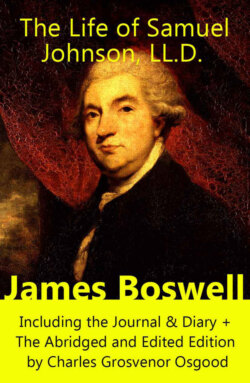Читать книгу The Life of Samuel Johnson, LL.D. - James Boswell - Страница 218
На сайте Литреса книга снята с продажи.
‘DEAR SIR,
Оглавление‘In supposing that I should be more than commonly affected by the death of Peregrine Langton[55], you were not mistaken; he was one of those whom I loved at once by instinct and by reason. I have seldom indulged more hope of any thing than of being able to improve our acquaintance to friendship. Many a time have I placed myself again at Langton, and imagined the pleasure with which I should walk to Partney[56] in a summer morning; but this is no longer possible. We must now endeavour to preserve what is left us,—his example of piety and oeconomy. I hope you make what enquiries you can, and write down what is told you. The little things which distinguish domestick characters are soon forgotten: if you delay to enquire, you will have no information; if you neglect to write, information will be vain[57].
‘His art of life certainly deserves to be known and studied. He lived in plenty and elegance upon an income which, to many would appear indigent, and to most, scanty. How he lived, therefore, every man has an interest in knowing. His death, I hope, was peaceful; it was surely happy.
‘I wish I had written sooner, lest, writing now, I should renew your grief; but I would not forbear saying what I have now said.
‘This loss is, I hope, the only misfortune of a family to whom no misfortune at all should happen, if my wishes could avert it. Let me know how you all go on. Has Mr. Langton got him the little horse that I recommended? It would do him good to ride about his estate in fine weather.
‘Be pleased to make my compliments to Mrs. Langton, and to dear Miss
Langton, and Miss Di, and Miss Juliet, and to every body else.
‘The wonder, with most that hear an account of his oeconomy, will be, how he was able, with such an income, to do so much, especially when it is considered that he paid for everything he had; he had no land, except the two or three small fields which I have said he rented; and, instead of gaining any thing by their produce, I have reason to think he lost by them; however, they furnished him with no further assistance towards his housekeeping, than grass for his horses, (not hay, for that I know he bought,) and for two cows. Every Monday morning he settled his family accounts, and so kept up a constant attention to the confining his expences within his income; and to do it more exactly, compared those expences with a computation he had made, how much that income would afford him every week and day of the year. One of his oeconomical practices was, as soon as any repair was wanting in or about his house, to have it immediately performed. When he had money to spare, he chose to lay in a provision of linen or clothes, or any other necessaries; as then, he said, he could afford it, which he might not be so well able to do when the actual want came; in consequence of which method, he had a considerable supply of necessary articles lying by him, beside what was in use.
‘But the main particular that seems to have enabled him to do so much with his income, was, that he paid for every thing as soon as he had it, except, alone, what were current accounts, such as rent for his house and servants’ wages; and these he paid at the stated times with the utmost exactness. He gave notice to the tradesmen of the neighbouring market-towns that they should no longer have his custom, if they let any of his servants have anything without their paying for it. Thus he put it out of his power to commit those imprudences to which those are liable that defer their payments by using their money some other way than where it ought to go. And whatever money he had by him, he knew that it was not demanded elsewhere, but that he might safely employ it as he pleased.
‘His example was confined, by the sequestered place of his abode, to the observation of few, though his prudence and virtue would have made it valuable to all who could have known it.—These few particulars, which I knew myself, or have obtained from those who lived with him, may afford instruction, and be an incentive to that wise art of living, which he so successfully practised.’ BOSWELL.
‘THE CLUB holds very well together. Monday is my night[58]. I continue to rise tolerably well, and read more than I did. I hope something will yet come on it[59]. I am, Sir,
‘Your most affectionate servant,
‘SAM JOHNSON’
‘May 10, 1766,
Johnson’s-court, Fleet-street.’
After I had been some time in Scotland, I mentioned to him in a letter that ‘On my first return to my native country, after some years of absence, I was told of a vast number of my acquaintance who were all gone to the land of forgetfulness, and I found myself like a man stalking over a field of battle, who every moment perceives some one lying dead.’ I complained of irresolution, and mentioned my having made a vow as a security for good conduct. I wrote to him again, without being able to move his indolence; nor did I hear from him till he had received a copy of my inaugural Exercise, or Thesis in Civil Law, which I published at my admission as an Advocate, as is the custom in Scotland. He then wrote to me as follows:
‘To JAMES BOSWELL, ESQ.
